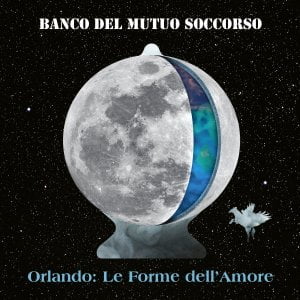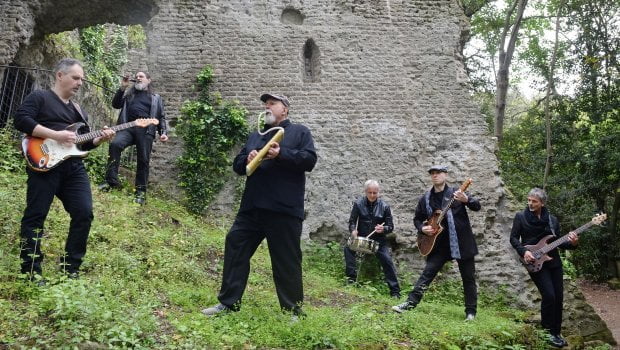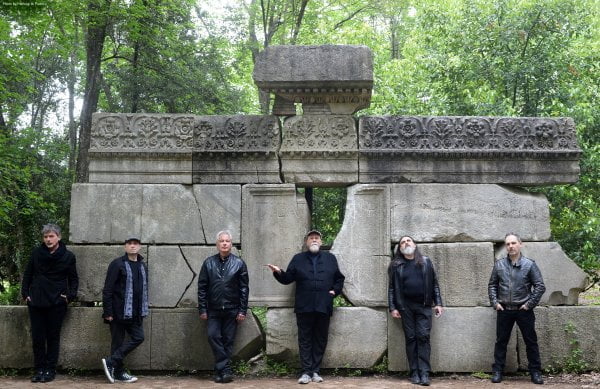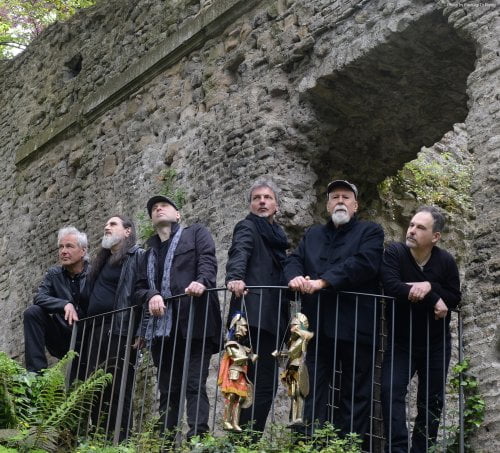With the surprise release of a new album from classic Italian band Banco del Mutuo Soccorso, Orlando: Le Forme dell’Amore, earlier this year, TPA’s Basil Francis had the opportunity to speak to keyboardist Vittorio Nocenzi, with contributions from the other band members…
Hello Vittorio! It’s a wonderful honour to have you with us on The Progressive Aspect. I understand that your new Orlando album is a project that you have been working on for almost a decade. How did the seeds for that idea come about and what is it like to see the project finally completed?
 Vittorio: Let me take you back to the beginning. On May 3rd, 1972, the Ricordi Dischi label in Milan released our eponymous album Banco del Mutuo Soccorso – which was later known simply as the “Piggy Bank” due to the shape of its cover. The first song was called In Volo and, in its verses recited by Francesco Di Giacomo and myself, were the character of Astolfo and his Hippogriff, the flying horse, two central figures among the characters of Ludovico Ariosto’s L’Orlando Furioso, the masterpiece poem of the Italian Renaissance.
Vittorio: Let me take you back to the beginning. On May 3rd, 1972, the Ricordi Dischi label in Milan released our eponymous album Banco del Mutuo Soccorso – which was later known simply as the “Piggy Bank” due to the shape of its cover. The first song was called In Volo and, in its verses recited by Francesco Di Giacomo and myself, were the character of Astolfo and his Hippogriff, the flying horse, two central figures among the characters of Ludovico Ariosto’s L’Orlando Furioso, the masterpiece poem of the Italian Renaissance.
This year, May 3rd 2022 is the 50th anniversary of its publication, and the beginning of the history of Banco del Mutuo Soccorso. We have never really celebrated anniversaries with flutes and champagne, but we really like important moments with concrete work. That’s why it immediately seemed wonderful to us, the possibility of putting not a simple candle on our 50th anniversary cake, but marking it with something tangible. This special cherry: a new album by Banco inspired and dedicated to Orlando Furioso.
It is a bit like returning to that ideal space from where we took off many years ago, with the desire to restart our history made of music, ideas, diversity, visions and dreams.
It all started with my son Michelangelo who came to me one morning and said, “Dad, what do you think if you write a new album, you and Francesco [Di Giacomo], inspired by Ariosto’s Orlando Furioso? It would be like returning to the same place where you started many years ago … listen, I wrote this song that could be Orlando’s declaration of love to Angelica, and she instead rejects it. Orlando, the most valiant of the emperor’s paladins, has just given up running to the aid of his fellow soldiers, attacked by the enemy who is exterminating them, to rush to save Angelica, the woman he loves, taken by the savages who are about to kill her. And she instead rejects him, because she fell in love with a Saracen, Medoro, one of the enemies, a modest simple soldier, unknown and worthless, preferred to the strongest of the emperor’s Paladins!”
I talked about it with Francesco and it immediately seemed like a great idea, both for the new album concept and for the celebration of the fiftieth anniversary. And we decided to start working on it as soon as possible. We were overwhelmed. Because, in this story of Orlando Furioso, there was a rejected love, of course, but behind the rejected lover there was much more: first of all a great war between West and East, between Christians and Muslim Saracens.
And then many other love stories! Indeed, this feeling was expressed in all possible ways that human beings have managed to make their own… In addition to ‘REJECTED LOVE’, precisely that of Orlando for Angelica, there is the ‘UNEXPECTED LOVE’, the one that sees Medoro as the object of Angelica’s love: he so insignificantly loved passionately by the most beautiful woman in the world!
There is ‘FRATERNAL LOVE’, that of Astolfo who decides to risk his life to save his friend Orlando, who has gone mad for love. Astolfo decides to go to the Moon to recover Orlando’s sense and bring it back to Earth and thus heal him from his madness!
And here we cannot fail to say how wonderful the Ariosto invention that transforms the Moon from a romantic symbol par excellence to a “dump” of those dreams that humans have renounced, of abandoned ideals… The Moon, where the senses of many men go to finish, becomes a large waste dump, of human sacrifices…
Then there is the ‘REFUSAL OF LOVE’, told by the war itself which is, par excellence, the triumph of hatred and the cancellation of love itself. There is the ‘POSSESSIVE LOVE’ of the sorceress Alcina for Astolfo who, wanting to leave, is closed by the sorceress in a hollow tree trunk and held prisoner, therefore considered not a source of love but a real possession! When the beloved is transformed into “property”, something that is only “ours” and to which we no longer leave other meanings… Or, again, ‘FORBIDDEN LOVE’, that of Ruggero Saraceno and Christian Bradamante, impossible love, hindered until the end from the Wizard Atlas! (Ruggero and Bradamante are Ariosto’s Giulietta and Romeo).
Fairy inventions such as the flying horse and the ring that makes one invisible (500 years before J.R.R. Tolkien wrote The Fellowship of the Ring!). Wizards and Wizards and much more!
It was advanced enough to inspire us to make a fantastic new concept album…
I would like to take you back to the beginning of your career with a question that has always fascinated me. As a fan of English prog, I have always marvelled at how progressive rock has seen a huge explosion in both the UK and Italy around the same time, but not as noticeably in other countries. The “Italian Progressive Rock” (RPI) is now a recognised sub-genre of prog rock, demonstrating the importance of the Italian movement, led by bands like Banco. Why do you think prog rock was so favoured in Italy, but not in the surrounding countries?
Vittorio: I believe there are a variety of reasons. To explain, I have to mention the history of Italy…
Italy is a particular nation, where cultures other than ours are followed with interest; they are not excluded a priori. We are not particularly chauvinists or nationalists, and I believe that this is precisely due to our history: since the times of the Roman Empire, Italy was the centre of the crossroads of many cultures, where various religions were all welcomed on an equal footing, the Roman Pantheon had Egyptian, Hebrew, Celtic and Germanic gods.
In the following centuries, Italian history has continued with the political and military presence of other nations, which have always aspired to dominate our country, such as Austria, France, Spain and so on. This, I believe, could have formed a mental precedent of openness to other cultures that many European nations do not have in their DNA.
Furthermore, Italy is the homeland of “bel canto”, of Opera, which was transversal as a musical genre, because it was both theatre and musical concert, and this aspect of spectacular musical representations, for Progressive rock, was one of the recurring characterisations (just remember Peter Gabriel’s Genesis, the live Pink Floyd concerts, real musical-visual works…). To all this is added a powerful and widespread youth movement in the late ’60s and early ’70s, which, in the transgression of bourgeois conformism, saw a way to free the minds of youth. Music was at that time the directory for the more powerful collective imagery of youth. Here then, the progressive rock protagonist of the first great festivals that were held throughout Italy in those years, became a megaphone for amplifying the discomforts and expectations of young people. Across Italy, thousands of musical groups began to proliferate, which saw progressive rock as a way of making “thinking” music; that is, expressing ideas and perspectives that were not only innovative in terms of music, but also socially, existentially, through a particular attention that was given to the lyrics and not just music in those years. So when the progressive rock of the great English bands arrived, Italy was for many of them a land of international consecration: for example, this is what happened to Gentle Giant, who achieved success first in Italy rather than in England, after their tour supporting Jethro Tull!
What were your personal musical influences when you formed the band?
Vittorio: In my hometown, Marino di Roma, there wasn’t much music in circulation. There were still no free radios or record shops in the 1950s. After World War II, most countries in Europe were repairing their cities and societies; culture was not the priority.
Since I had little knowledge of contemporary music, my musical references were the classics of European music, giants like Beethoven and Bach in particular, who I studied at the piano taking private music lessons, as well as some rare records. But I remember one of Vanilla Fudge, a band I particularly loved, and then of course the Beatles, whose Sgt. Pepper’s Lonely Hearts Club Band struck a deep chord within me. I consider it to be the first concept prog album in history. I didn’t know any other prog bands, I had never heard of ELP, or Genesis.
In ’72 we had formed the new Banco line-up, the one that later went down in history for the “piggy bank” debut album. Our guitarist, Marcello Todaro, brought me some albums by English and American bands. Among these, I remember a Moody Blues album that had a prehistoric painting as a cover. But I don’t remember the title [possibly To Our Children’s Children’s Children?].
More of my influences come from my childhood. I started playing in bands when I was nine years old. By 1960 in Italy, the concept of a rock band hadn’t been born yet; we were playing classical songs that were normally played by an orchestra, but with a reduced set of musicians. The concept of bands playing their own material was still novel to us. Later, I started playing in professional bands that accompanied the concerts of great solo singers. One in particular I like to remember was Gabriella Ferri, a Roman singer-songwriter already very famous in Italy, but who performed a repertoire mainly of folk music.
I really like how your first English-language album Banco (1975) features newly recorded editions of R.I.P. and Metamorfosi with new arrangements. Were these new arrangements made for that recording, or had they evolved when you played the songs live?
Vittorio: Both things: we rearranged them on the occasion of the recordings of our first album for Manticore, the English label of ELP. But some ideas of the new arrangements were born during the band’s live concerts in Italy as reworkings of the original arrangements.
What are your favourite Banco albums and/or songs?
Vittorio: For me, the songs would be La conquista della posizione eretta, Eterna Transiberiana and Non mi spaventa più l’amore, the albums being Darwin! (1972), …di terra (1978) and the new one, Orlando: Le Forme dell’Amore (2022).
Filippo Marcheggiani: I would go with the same three albums and La conquista della posizione eretta, the other songs being Né più di un albero non meno di una stella and Il grande bianco.
Fabio Morseco: I would pick Il giardino del mago, R.I.P. and Moonsuite, and the new album alongside the self-titled first one.
Tony D’Alessio: I would choose R.I.P. and Canto nomade per un prigioniero politico, with the albums Darwin! (1972) and Orlando: Le Forme dell’Amore (2022).
Nico Di Già: I would pick Il ragno and the albums Canto di primavera (1979), Io sono nato libero (1973) and the new album Orlando: Le Forme dell’Amore (2022).
Marco Capozi: I would choose Il giardino del mago and Michele e il treno and the albums Darwin! (1972) and …di terra (1978).
Tony, I heard you were an X Factor contestant before joining Banco. What was that experience like, and how did you do?
Tony D’Alessio: It was a lot of fun, a game for me, but music is something else.
Were you a longtime fan of Banco before you joined the group?
Tony: Absolutely. This is how it all began. In 1997, I saw them at a concert. At the counter I approached the band and from there grew a friendship, which we maintained until our collaboration.
Your predecessor, Francesco Di Giacomo, had one of the most recognisable voices in prog rock. How has it been to fill those large boots?
Tony: I put on three pairs of socks! It was a great honour, and it still is!
How often do you find yourself being compared to him?
Tony: Far too many times I would say, because it is like comparing myself to my father who is no longer there. It honours me but it makes me suffer. From the moment I joined Banco, my main commitment was to express my personality only and to absolutely avoid any emulation of Francesco, even indirectly: this is what Vittorio was asking of me and I immediately shared his vision.
What was the creative process for Orlando?
Vittorio: The same method used for Transiberiana (2019): first, clarify the design of the concept, elucidating the main characters well. We try to avoid formalisms in this case as there is the danger that it could make us fall into “academicism” which would take away from the emotion of the piece. Immediately, we identify the various episodes of Orlando to be set to music and immediately see if it was possible to have a meaningful whole, so that the general narrative had strength and emotionality.
Only at this point did we start writing the musical compositions, rigorously inspired by the Ariosto episode and its emotional interpretation, both poetically and musically. For each episode identified, we first proceeded to complete and “close” the compositional writing; only then did we call the band to give their contribution during the recording sessions of the arrangements. In Transiberiana, these were the most exciting moments, because it is the litmus test: at that time, you finally get to hear the music out loud, and see if it works as well as you imagined, and get feedback from others. It’s a lot of work! A tailor can design a brilliant suit, but will only know if it’s a success once it has been worn.
But when we heard those songs written on the piano “wearing” the sounds of the band – the guitars of Marcheggiani, Di Già, the rhythms of Moresco, the bass lines of Capozi and above all then the voice of Tony D’Alessio giving life to all the words written and dreamt of by Paolo Logli and designed by him and my son Michelangelo – only then did everyone’s emotion become tangible, like something that bewitched us inside, making us feel ineffable emotions!
Did you ever expect to make new music under the Banco name fifty years after starting the band?
Vittorio: Absolutely not! Indeed, if someone had told me, I would have thought that they were making fun of me. Still, I’ve never taken it for granted (and hopefully never will) but that I have been able to see how even the most unattainable dreams can instead come true, and it has already happened to me several times during my life… it’s just something I never could have predicted.
However, I reckon that it happened precisely because I remained the visionary that I was as a boy, although it is obvious that positive thinking is not enough to make dreams and expectations come true!
If you have one message for your fans, what would it be?
Vittorio: We must always work towards our dreams, desire them with open eyes and with our feet firmly planted on the ground and always do our part as best as possible… and then we’ll see! This time we saw how much music would have died, without ever seeing the light, if I hadn’t wanted to continue at all costs this ancient story called Banco del Mutuo Soccorso, but it doesn’t always end like this…
At the very least try to defend your dreams before others kill them! Always!
Do you plan to continue making albums at this point?
Vittorio: Of course. It is my way of life, and what I am used to.
Thank you Vittorio, and the rest of the Banco line-up, for speaking to us today!
Vittorio: Thanks very much!
We look forward to seeing you soon on tour.
Vittorio: To you as well! See you in England!
[You can read Basil’s review of Banco dell Mutuo Soccorso’s new album, Orlando: Le Forme dell’Amore, HERE.]
LINKS
Banco del Mutuo Soccorso – Website | Facebook | Twitter | Instagram



